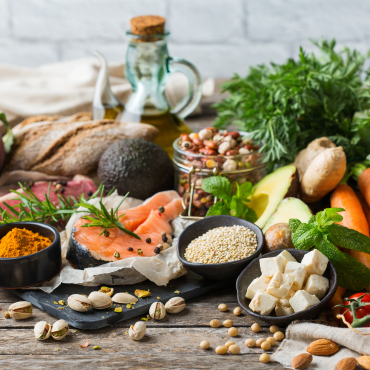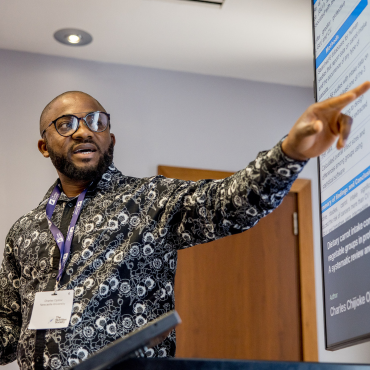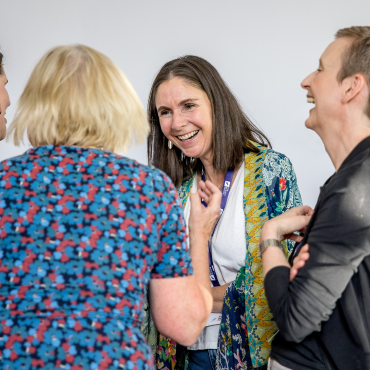
Themes
Themes represent new and developing areas of nutritional science, they exist to promote and support the advancement of nutritional science. They support member focused interests, representing a more balanced portfolio and constituency between Theme Leads. Each Theme is led by a Theme Lead who acts as a direct link between you, the members, and the Science Committee.
The Special Interest Groups (SIGs) within each theme support members with specific areas of interest to ensure that the needs of the membership and their interests are fully supported.
Themes and SIGs


Theme: Food Systems
This theme encompasses areas including food production, processing, reformulation; organic; food safety and toxicity; food systems and sustainability issues; functional foods and nutraceuticals; novel ingredients; animal nutrition; together with research on hedonics and the physiology of eating.
School Food Systems
Chair: Dr Suzanne Spence, University Research Fellow, Newcastle University
Global School Health and Nutrition
Chair: Dr Robert Akparibo, Senior University Teacher (Associate Professor), University of Sheffield
Plant-based diets and health
Co-Chair: Dr Tammy Tong, Nuffield Department of Population Health (NDPH), University of Oxford
Co-Chair: Dr Keren Papier, Nuffield Department of Population Health (NDPH), University of Oxford


Theme: Nutrition in the treatment, management and prevention of disease
This theme focuses on disease-facing (both communicable and non-communicable) topics and includes foods and nutrients as risk factors for diseases, nutrition in strategies for disease prevention, and nutrition in the management and treatment of clinical conditions.
Phytochemicals & health
Chair: Dr Ana Rodriguez-Mateos, King’s College London and Dr Charlotte Mills, University of Reading
Nutrition, physical activity and cancer
Chair: Dr Monika Gostic, Teaching Fellow at University of Aberdeen and Miss Toral Shah, Nutritional Scientist at The Urban Kitchen
Diet and Health of Ethnic Minority Groups
Chair: Professor Basma Ellahi, Professor of Public Health Nutrition, University of Chester and Dr Hibbah Osei-Kwasi, University of Loughborough


Theme: Nutrition and optimum life course
This theme is defined by activities encompassing exercise & sports nutrition, healthy ageing, weight management, pregnancy/childhood/adolescence; alternative diets such as vegetarianism/veganism; chrono-nutrition; personalised nutrition; gut microbiome etc fall into this space.
Workplace diet and health
Chair: Dr. Rachel Gibson (Registered Dietitian - BDA), King’s College London
Nutrition in healthy ageing
Co-Chair: Dr Miriam Clegg (Senior Lecturer, University College, Cork)
Co-Chair: Dr Claire McEvoy (Senior Lecturer, Queens University Belfast)
Sport and exercise nutrition
Chair: Dr Oliver Witard, Senior Lecturer in Exercise Metabolism & Nutrition, King's College London


Theme: Novel nutrition research methodologies and technologies
This theme encompasses the development of methodologies by which nutrition is studied, including innovative study design and research methods, app and virtual approaches, novel data collection methodologies, big data, and novel data analytics.
Interdisciplinary nutrition: fostering innovative thinking for future breakthroughs
Chair: Dr Juliano Morimoto, Senior Lecturer at the University of Aberdeen.
Nutritional Psychiatry
Co-Chair: Dr Piril Hepsomali, Lecturer at the University of Reading.
Co-Chair: Dr Dan Lamport, Associate Professor at the University of Reading.


Propose a Special Interest Group (SIG)
Members are invited to submit applications for Special Interest Groups (SIGs). This will be a rolling application process with no deadline in the first instance.
Propose your Special Interest Group by completing the form below.
FAQ
Frequently Asked Questions about (SIG) Special Interest Groups for members.
What is a Special Interest Group (SIG)?
SIGs provide recognition and support for specific areas of member’s interest. This Theme-based initiative has been introduced to ensure that the needs of our growing membership and its varied research areas are fully supported.
How many SIGs are there?
We currently have seven Special Interest Groups:
- Diet and Health of Ethnic Minority Groups
- Global School Health and Nutrition
- Nutrition, Physical Activity, and Cancer
- Nutrition in Healthy Ageing
- Phytochemicals and Health
- School Food Systems
- Workplace Diet and Health
Can anyone be a member of a SIG?
You need to be a current member of The Nutrition Society to be a SIG member as SIGs are a membership benefit. For more membership information you can see here.
Who runs the SIG?
Each SIG sits within one of our Themes and members of the Society can apply to run a SIG. The members who have applied and been approved to start the SIG will chair the SIG.
How can I join a SIG?
It’s simple, please complete and submit the online application form here.
Can I join more than one SIG?
Yes, members are welcome to join as many SIGs of interest as they wish.
What happens in the SIGs?
SIGs share information and best practice, and champion novel areas of nutrition research. SIGs may also support collaborate with relevant external partners, and stakeholders or could support regional activities. SIGs host events of interest to their networks, such as careers events or gatherings to build research capacity or convene new research groups and facilitate a discussion in the forum on Member-Connect.
These networks will be an excellent way to develop professional contacts and to share interests.
Can I propose a SIG?
All members can submit applications for SIGs. This will be a rolling application process with no deadline in the first instance. Propose your Special Interest Group by completing the form.
How can I interact with other SIG members?
Some of the SIGs use the online discussion platform Member-Connect to hold initial debates and talk through issues. Log on to Member-Connect via your member area and start your discussion in the forum area, where you will find the banner for your SIG.
How do I use Member-Connect?
This helpful guide shows you how to upload information onto the platform.

Join today
Membership of our global nutritional science community offers a host of benefits, from access to the latest evidence based research to event discounts and travel grants.
